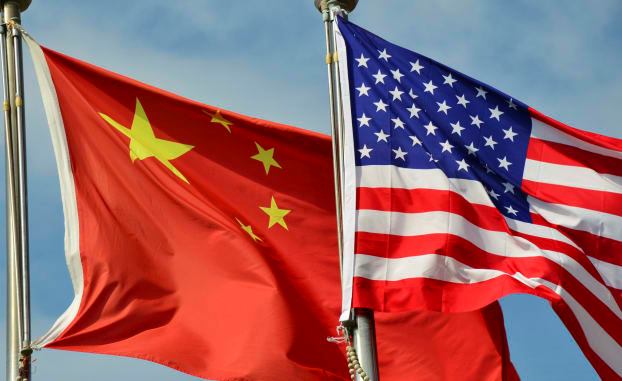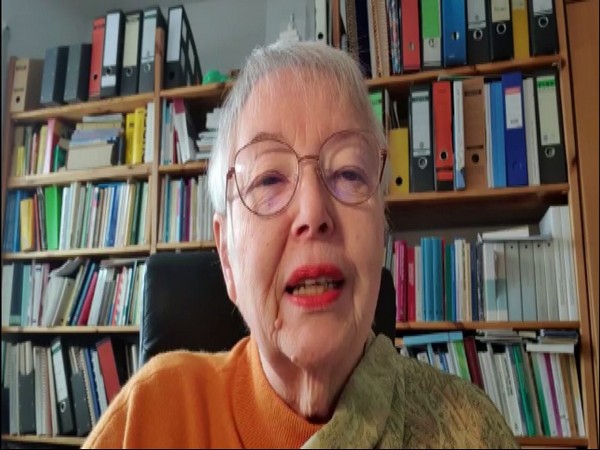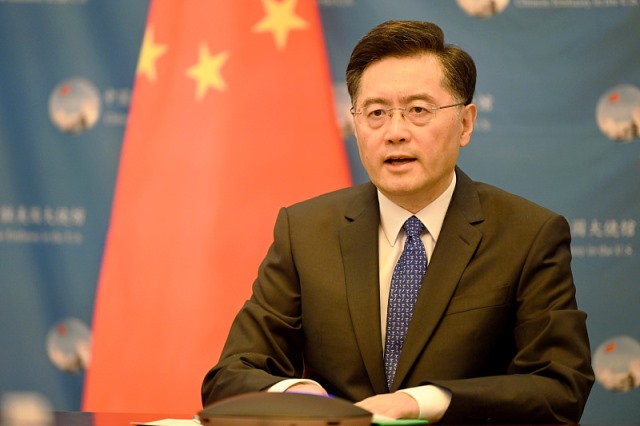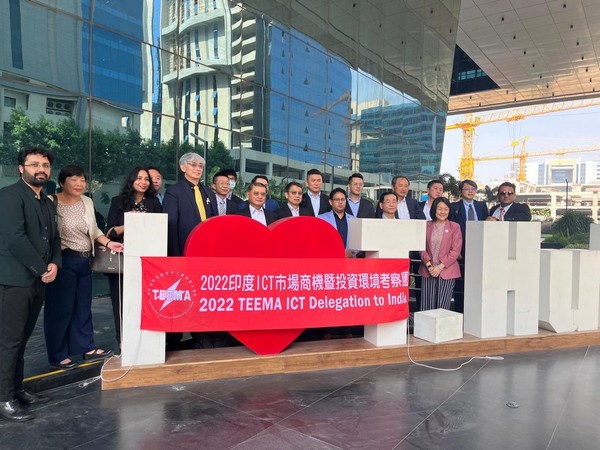Tensions between the United States and China continue to simmer despite the meeting between US President Joe Biden and his Chinese counterpart Xi Jinping in November and high-level visits by Biden administration officials to China to ease differences on trade, Taiwan and Ukraine-Russia war as both Washington and Beijing engaged in tit-for-tat actions.
This year, US Secretary of State Antony Blinken was scheduled to visit Beijing in February to hold talks with the Chinese leadership. However, Blinken’s highly anticipated visit to Beijing was postponed after a Chinese balloon appeared over the US.
US military fighter jets shot down the suspected Chinese surveillance balloon over the Atlantic Ocean off the Eastern Seaboard of the United States, US Defence Secretary Lloyd Austin said, CNN reported.
Austin announced that Biden had approved the downing of the balloon. The Chinese balloon was first spotted in the sky over Montana and travelled across the middle of the country following weather patterns before it exited the continental United States.
In his statement, Lloyd Austin said American fighter aircraft “successfully brought down the high-altitude surveillance balloon launched by and belonging to the People’s Republic of China (PRC) over the water off the coast of South Carolina in US airspace.”
He said Biden gave his authorization “as soon as the mission could be accomplished without undue risk to American lives under the balloon’s path.”
China expressed its “strong dissatisfaction and protest” against the shooting down of its balloon. The Chinese Foreign Ministry said the US was “overreacting” and “seriously violating international practice,” according to a CNN report. China said the vessel was a weather balloon thrown off course.
In the statement, the Chinese Foreign Ministry said, “The Chinese side has repeatedly informed the US side after verification that the airship is for civilian use and entered the US due to force majeure–it was completely an accident.”
Following the downing of the Chinese balloon, China refused to hold talks with US Defence Secretary Lloyd Austin, highlighting the lack of communication channels between the two nations.
According to the Pentagon, the US Defence Department submitted a request for a call between Austin and China’s Minister of National Defence, Wei Fenghe, after the US fighter jets shot down the balloon. The Pentagon said that China rejected the request of the US.
In the statement, Pentagon spokesman Brigadier General Pat Ryder said, “We believe in the importance of maintaining open lines of communication between the United States and the [People’s Republic of China] in order to responsibly manage the relationship.”
The Biden administration imposed restrictions on sales of some US technology to several Chinese aviation and technology companies, as part of its response to a Chinese spy balloon that appeared in US airspace, The New York Times reported.
The US Commerce Department added five Chinese companies and one research institute to its so-called entity list, which will stop firms from selling them American parts and technologies without a special license.
According to officials, the six entities had supported Chinese military programs related to airships and balloons used for intelligence and reconnaissance, according to The New York Times report.
In March, Taiwan President Tsai Ing-wen arrived in New York City despite Beijing’s warning that her visit could lead to “serious confrontation” between China and the US. Taiwan faced “tremendous challenges,” Tsai said from the city, where she made the first of two planned stopovers in the US on either side of an official visit to Central America, CNN reported.
Tsai’s visit to the US sparked sharp condemnation from Beijing, which claims Taiwan as its territory despite never having controlled it. Speaking to reporters in Washington, China’s charge d’affaires Xu Xueyuan said Tsai’s US transit could lead to a “serious” confrontation in the US-China relationship and have a “severe impact” on their ties.
Following Tsai’s visit, China imposed sanctions on two US organisations that hosted the Taiwan President during her stopover in the US. China’s Ministry of Foreign Affairs announced a ban on Washington-headquartered think tank Hudson Institute and the Ronald Reagan Presidential Library in California from any cooperation, exchange or transaction with institutions and individuals in China.
Furthermore, key leaders of the two organisations were also barred from travelling to China or cooperating with organisations or individuals there. China’s Ministry of Foreign Affairs said, “The Hudson Institute and the Reagan Library have provided a platform and facilitated Tsai’s separatist activities… which seriously undermine China’s sovereignty and territorial integrity,” CNN reported.
Notably, Tsai and then-US House Speaker Kevin McCarthy held a meeting at the Ronald Reagan Presidential Library.
In June this year, Antony Blinken finally travelled to China and held talks with Chinese President Xi Jinping, Director of the Chinese Communist Party Central Committee Foreign Affairs Commission Office Wang Yi.
During his visit to China, Blinken also met China’s then-Foreign Minister, Qin Gang. US Department of State Spokesperson Matthew Miller said Blinken held “candid, substantive, and constructive talks” with Qin Gang in Beijing.
During his visit to China, Blinken raised concerns regarding China’s human rights violations in Xinjiang, Tibet, Hong Kong and individual cases of concern. He also spoke about China’s “unfair and non-market economic practices.”
In a statement about Blinken’s visit to China, US Department of State Spokesperson Matthew Miller said, “The Secretary addressed the PRC’s unfair and nonmarket economic practices and recent actions against US firms. He discussed US de-risking policies and the historic domestic investments the administration has made.
“The Secretary raised concerns about PRC human rights violations in Xinjiang, Tibet, and Hong Kong, as well as individual cases of concern. He emphasised that the United States will always stand up for our values,” he added.
Blinken stressed that it remains a priority for the US to resolve the cases of American citizens who are wrongfully detained or subject to exit bans in China, according to the statement released by Blinken.
He underscored the importance of maintaining peace and stability across the Taiwan Strait and reiterated there has been no change on US one-China policy.
Notably, the ties between the US and China became strained after then-US House of Representatives Speaker Nancy Pelosi visited Taiwan in August, 2022. China expressed anger over her visit to Taiwan, as Beijing claims it as a part of its territory. In response to her visit, China began military drills in the air and waters around Taiwan. China blocked off military communications with US after Pelosi’s travelled to Taiwan.
After a year of meeting in Bali, US President Joe Biden and his Chinese counterpart Xi Jinping met on the sidelines of the Asia-Pacific Economic Cooperation summit in San Francisco in November. The meeting between the two leaders was held after relations between the two nations deteriorated after the US shot down the suspected Chinese spy balloon in February.
At the meeting, Biden and Xi reopened military-to-military communications. However, experts said the Biden-Xi meeting did not remove many of the tensions between China and the US.
Rorry Daniels, managing director of the Asia Society Policy Institute, stressed that the meeting is not a “breakthrough” in resolving the strategic mistrust.
Rorry Daniels, managing director of the Asia Society Policy Institute, said, “This meeting is not a breakthrough in resolving the strategic mistrust that characterises this relationship. But it is an important step forward in getting the relationship on a manageable track,” The Hill reported.
During the meeting, Biden emphasised that the United States and China are in competition and added that the US will continue to invest in the sources of American strength at home and align with allies and partners around the world, according to the readout of the meeting between Biden and Xi Jinping.
He stressed that the US will always stand up for its interests, its values, and its allies and partners. Biden also raised concerns regarding China’s human rights abuses, including in Xinjiang, Tibet, and Hong Kong. He stressed that the US’ one China policy has not changed and has been consistent across decades and administrations.
“He reiterated that the United States opposes any unilateral changes to the status quo from either side, that we expect cross-strait differences to be resolved by peaceful means, and that the world has an interest in peace and stability in the Taiwan Strait,” read White House statement.
“He called for restraint in the PRC’s use of military activity in and around the Taiwan Strait. President Biden also raised continued concerns about the PRC’s unfair trade policies, non-market economic practices, and punitive actions against US firms, which harm American workers and families,” it added.
David Ochmanek, a senior international and defence researcher at the RAND Corporation, said the resumption of military channels was a good sign and could help to resolve tensions, but it does not solve the broader issue.
“If they don’t change, then this doesn’t necessarily have much meaning,” The Hill quoted David Ochmanek as saying.
Ochmanek said, “Reopening the channels doesn’t, in and of itself, reduce the possibility of mishaps, accidents, escalating tensions and things like that, [but] it does offer a relief valve if something risky happens.”
After a year that sparked tensions between the US and China over the Chinese balloon and Taiwan, 2024 could bring new turbulence. From the presidential elections in Taiwan and the US to trade fights between the US and China, it remains to be seen how China reacts to the elections in Taiwan and how the US will respond to them. (ANI)
For more details visit us: https://lokmarg.com/








